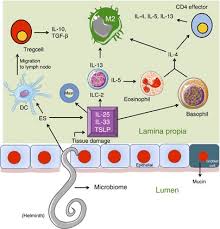Worm infections, also known as helminthiasis, affect millions of people worldwide, particularly in regions with poor sanitation and limited access to clean water. These parasitic infections can lead to malnutrition, anemia, and other serious health complications if left untreated. Fortunately, effective treatments like Ivermectin (brand name Stromectol, also sold as Iverheal 6 mg and 12 mg tablets) can help eliminate these parasites.
In this comprehensive guide, we’ll explore the most common types of human worm infections, their symptoms, and how to treat them effectively.
1. What Are Worm Infections?
Worm infections occur when parasitic worms (helminths) invade the human body. These worms thrive in the intestines, blood, or tissues, feeding off their host and causing various health issues. They are typically transmitted through contaminated food, water, soil, or insect bites.
How Do Worm Infections Spread?
- Ingestion of contaminated food or water (e.g., undercooked meat, unwashed vegetables).
- Skin penetration (e.g., walking barefoot on infected soil).
- Insect bites (e.g., mosquitoes transmitting filarial worms).
- Person-to-person contact (in cases like pinworms).
2. Common Types of Human Worm Infections
A. Roundworms (Ascariasis)
Caused by: Ascaris lumbricoides
Transmission: Consuming contaminated food or water containing roundworm eggs.
Symptoms:
- Abdominal pain
- Diarrhea or bloody stools
- Malnutrition and stunted growth (in children)
- Visible worms in stool
Treatment:
- Albendazole or Mebendazole (common anthelmintic drugs).
- Ivermectin (Stromectol/Iverheal) may also be effective in some cases.
B. Tapeworms (Cestodiasis)
Caused by: Taenia saginata (beef tapeworm), Taenia solium (pork tapeworm), and others.
Transmission: Eating undercooked infected meat.
Symptoms:
- Abdominal discomfort
- Weight loss
- Nausea and vomiting
- Segments of worms in stool
Treatment:
- Praziquantel (primary treatment).
- Albendazole may also be used.
- Ivermectin is less common for tapeworms but may help in certain cases.
C. Hookworms (Ancylostomiasis & Necatoriasis)
Caused by: Ancylostoma duodenale and Necator americanus.
Transmission: Walking barefoot on contaminated soil (larvae penetrate the skin).
Symptoms:
- Itchy rash at entry site
- Anemia (due to blood loss)
- Fatigue and weakness
- Abdominal pain and diarrhea
Treatment:
- Albendazole or Mebendazole.
- Ivermectin (Stromectol/Iverheal 6 mg or 12 mg) is also effective.
D. Whipworms (Trichuriasis)
Caused by: Trichuris trichiura.
Transmission: Ingesting soil or food contaminated with whipworm eggs.
Symptoms:
- Chronic diarrhea (sometimes bloody)
- Abdominal pain
- Rectal prolapse (in severe cases)
Treatment:
- Albendazole or Mebendazole.
- Ivermectin may be used in combination therapies.
E. Pinworms (Enterobiasis)
Caused by: Enterobius vermicularis.
Transmission: Ingesting pinworm eggs (often through contaminated hands or surfaces).
Symptoms:
- Intense anal itching (especially at night)
- Restlessness and sleep disturbances
- Visible tiny white worms near the anus
Treatment:
- Mebendazole or Pyrantel pamoate.
- Ivermectin can be an alternative treatment.
F. Threadworms (Strongyloidiasis)
Caused by: Strongyloides stercoralis.
Transmission: Skin contact with contaminated soil.
Symptoms:
- Abdominal pain and diarrhea
- Skin rash (larva currens – a fast-moving, itchy rash)
- Cough (if larvae migrate to the lungs)
Treatment:
- Ivermectin (Stromectol/Iverheal) is the drug of choice.
- Albendazole is an alternative but less effective.
G. Filarial Worms (Lymphatic Filariasis)
Caused by: Wuchereria bancrofti, Brugia malayi.
Transmission: Mosquito bites.
Symptoms:
- Swelling in limbs (lymphedema)
- Thickened skin (elephantiasis)
- Fever and chills
Treatment:
- Ivermectin (Stromectol) combined with Albendazole or Diethylcarbamazine (DEC).
3. How Ivermectin (Stromectol/Iverheal) Works Against Worm Infections
What Is Ivermectin?
Ivermectin is an antiparasitic medication that paralyzes and kills parasites by disrupting their nervous system. It is highly effective against:
- Strongyloidiasis (threadworms)
- Onchocerciasis (river blindness)
- Lymphatic filariasis (when combined with other drugs)
- Scabies and lice (ectoparasites)
Dosage and Administration
- For Strongyloidiasis: A single dose of Ivermectin (200 mcg/kg).
- For Filariasis: Yearly doses alongside Albendazole or DEC.
- Available as: Stromectol (Ivermectin 3 mg, 6 mg, 12 mg) or Iverheal (6 mg, 12 mg tablets).
Side Effects of Ivermectin
Most side effects are mild and include:
- Dizziness
- Nausea
- Diarrhea
- Mild skin rash
Note: Ivermectin should not be used in pregnancy or in children under 15 kg without medical supervision.
4. Prevention of Worm Infections
- Wash hands thoroughly before eating and after using the toilet.
- Cook meat properly to kill tapeworm larvae.
- Avoid walking barefoot in high-risk areas.
- Drink clean, filtered water.
- Deworming programs in endemic regions.
5. When to See a Doctor
Seek medical attention if you experience:
- Persistent diarrhea or vomiting
- Blood in stool
- Severe abdominal pain
- Unexplained weight loss
Conclusion
Worm infections are a significant global health concern, but they can be effectively treated with medications like Ivermectin (Stromectol/Iverheal). Proper hygiene, safe food practices, and timely treatment can prevent complications. If you suspect a worm infection, consult a healthcare provider for accurate diagnosis and treatment.
By staying informed and taking preventive measures, you can protect yourself and your family from these parasitic infections.



